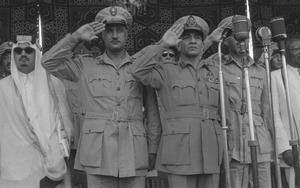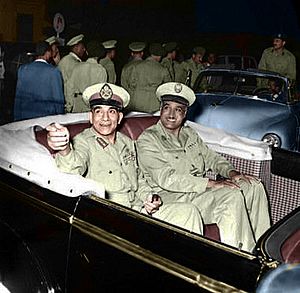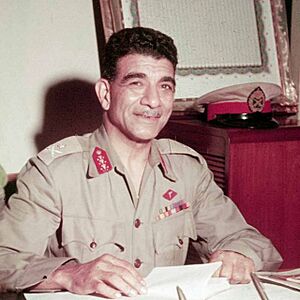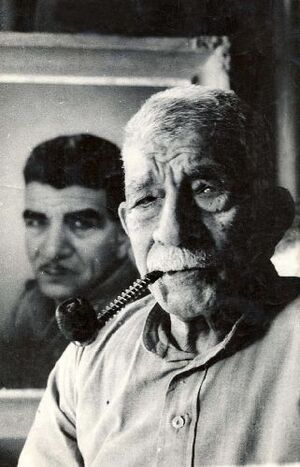Mohamed Naguib facts for kids
Quick facts for kids
Mohamed Naguib
|
|
|---|---|
|
محمد نجيب
|
|
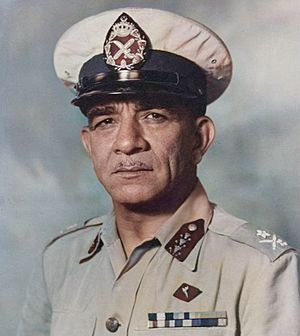 |
|
| 1st President of Egypt | |
| In office 18 June 1953 – 25 February 1954 |
|
| In office 27 February 1954 – 14 November 1954 |
|
| Prime Minister | Himself Gamal Abdel Nasser |
| Preceded by | Position established (Fuad II as King of Egypt) |
| Succeeded by | Gamal Abdel Nasser |
| Prime Minister of Egypt | |
| In office 8 March 1954 – 18 April 1954 |
|
| President | Himself |
| Preceded by | Gamal Abdel Nasser |
| Succeeded by | Gamal Abdel Nasser |
| In office 7 September 1952 – 25 February 1954 |
|
| Monarch | Fuad II (until 18 June 1953) |
| President | Himself (from 18 June 1953) |
| Preceded by | Ali Maher |
| Succeeded by | Gamal Abdel Nasser |
| Minister of War and Navy | |
| In office 7 September 1952 – 18 June 1953 |
|
| Prime Minister | Himself |
| Preceded by | Ali Maher |
| Succeeded by | Abdel Latif Boghdadi |
| Personal details | |
| Born | 19 February 1901 Khartoum, Egypt |
| Died | 28 August 1984 (aged 83) Cairo, Egypt |
| Cause of death | Liver cirrhosis |
| Political party | Military/Liberation Rally |
| Spouse |
Aisha Labib
(m. 1934; died 1971) |
| Awards | Order of the Nile Order of the Republic |
| Signature | |
| Military service | |
| Allegiance | |
| Branch/service | |
| Years of service | 1918–1954 |
| Rank | |
| Unit | Infantry |
| Battles/wars | 1942 Abdeen Incident 1948 Arab–Israeli War
|
Mohamed Naguib (born February 19, 1901 – died August 28, 1984) was an Egyptian general and revolutionary leader. He was a key figure, along with Gamal Abdel Nasser, in the Egyptian Revolution of 1952. This revolution ended the rule of the king in Egypt and Sudan. It led to the creation of the Republic of Egypt and the independence of Sudan.
Naguib was a respected general who was injured during the 1948 Arab–Israeli War. He became the leader of the Free Officers Movement. This group of army officers wanted British troops to leave Egypt and Sudan. They also opposed the corruption of King Farouk. After King Farouk was removed in July 1952, Naguib became the head of the Revolutionary Command Council. He also served as the prime minister and the first President of Egypt. He successfully worked to make Sudan independent and had all British soldiers leave Egypt. However, he later had disagreements with other Free Officers, especially Nasser. He was forced to resign in November 1954, and Nasser took over as president.
Contents
Early Life and Education
Mohamed Naguib was born on February 19, 1901, in Khartoum, which was then part of Anglo-Egyptian Sudan. His father, Youssef Naguib, was an officer in the Egyptian Armed Forces. His mother, Zohra Ahmed Othman, was from an Egyptian family living in Sudan. Mohamed was the oldest of nine children.
Naguib went to military school at Gordon Memorial College in Khartoum. He graduated in 1918. In 1923, he joined the Egyptian Royal Guard. He was the first Egyptian military officer to get a law license in 1927. He also earned two more degrees in political economy (1929) and civil law (1931).
Military Career and Achievements
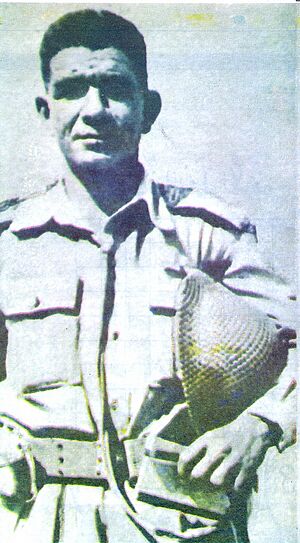
In December 1931, Naguib was promoted to captain. He later moved to the border patrol in Arish in 1934. He helped carry out the terms of the Anglo-Egyptian treaty of 1936. This treaty dealt with the relationship between Britain and Egypt. In 1937, he started a newspaper for the Egyptian Armed Forces in Khartoum. He became a major in 1938.
Naguib offered to resign after the Abdeen Palace incident of 1942. He felt he had failed to protect the King during a British siege of the palace. However, his resignation was not accepted. He continued to rise in the military ranks. He became a lieutenant colonel and governor of the Sinai Peninsula in 1944. In 1948, he was promoted to brigadier general.
Naguib was a hero during the 1948 Arab–Israeli War. He was wounded seven times in battle. For his bravery, he received the first military star of Fuad and the title of Bey. He then became the director of the Egyptian Military Academy. There, he met the members of the Free Officers Movement.
The Free Officers Movement
The Free Officers Movement was a group of Egyptian army officers. They were unhappy with the British military presence in Egypt and Sudan. They also believed that King Farouk and the government were corrupt and weak. They felt the King had not protected Egypt's interests, especially during the war in Palestine. Many Palestinians were forced to leave their homes during this conflict.
Gamal Abdel Nasser originally led the Free Officers. Most members were young and from ordinary backgrounds. Nasser felt the movement needed an older, respected officer to be taken seriously. Mohamed Naguib was famous and well-regarded, so he was asked to lead the movement. This helped the Free Officers gain support. However, it later led to a power struggle between Naguib and Nasser. Naguib saw himself as the true leader, while the younger officers saw him as a symbol.
The 1952 Egyptian Revolution
On July 23, 1952, the Free Officers started their revolution. They launched a coup d'état to remove King Farouk from power. Naguib was immediately made Commander in Chief of the Army. This helped ensure the army's loyalty to the revolution. His reputation as a war hero and his friendly personality made him a comforting figure to the Egyptian people.
The Free Officers first worked with Aly Maher Pasha, a former prime minister. He was known for opposing British influence in Egypt. A British diplomat told Naguib that Britain supported King Farouk's removal. He said Britain would only get involved if British lives or property were in danger. This message reassured the Free Officers.
On July 26, 1952, Maher gave King Farouk an ultimatum from Naguib. The King had to give up his throne and leave Egypt by 6 PM the next day. If not, Egyptian troops would storm his palace. Farouk agreed. The next day, he boarded the Royal yacht Mahrousa and left Egypt. Naguib later described how crowds celebrating the revolution delayed his trip to meet the King.
In September, Naguib became prime minister. King Farouk's infant son, Fuad II, became the last King of Egypt. This was to prevent Britain from interfering. On June 18, 1953, the revolutionaries ended the Kingdom of Egypt. They declared the establishment of the Republic of Egypt.
First President of Egypt
When the Republic was declared, Naguib became its first President. Because previous rulers of Egypt were not native Egyptians, Naguib was seen as the first native Egyptian ruler since ancient times.
Forced to Resign
Naguib started to act more independently from the Revolutionary Command Council (RCC). He disagreed with some of their decisions, like land reform. He also became closer to other political groups. Nasser then accused Naguib of supporting the outlawed Muslim Brotherhood. He also claimed Naguib wanted to become a dictator.
A power struggle began between Naguib and Nasser for control of the military and Egypt. Nasser eventually won. In November 1954, he forced Naguib to resign as president. Naguib was then placed under house arrest in a villa in Cairo. He remained under house arrest until 1971, when President Anwar Sadat released him.
Later Life and Death
Mohamed Naguib was married and had four children: three sons (Farouk, Yusuf, and Ali) and one daughter. His daughter passed away in 1951.
Naguib died on August 28, 1984, in Cairo, Egypt. He was 83 years old and died from liver cirrhosis. He received a military funeral, which was attended by President Hosni Mubarak.
Legacy
Before he died in 1984, Naguib published his memoirs. The book was called I Was a President of Egypt and was also translated into English as Egypt's Destiny. A station on the Cairo Metro is named in his honor. A major road in Khartoum is also named after him.
In December 2013, the interim Egyptian President Adly Mansour honored Naguib. He was given the Order of the Nile, which is Egypt's highest honor. His son, Mohamed Yusuf, accepted the award.
See also
 In Spanish: Muhammad Naguib para niños
In Spanish: Muhammad Naguib para niños
- List of rulers of Egypt
 | George Robert Carruthers |
 | Patricia Bath |
 | Jan Ernst Matzeliger |
 | Alexander Miles |


